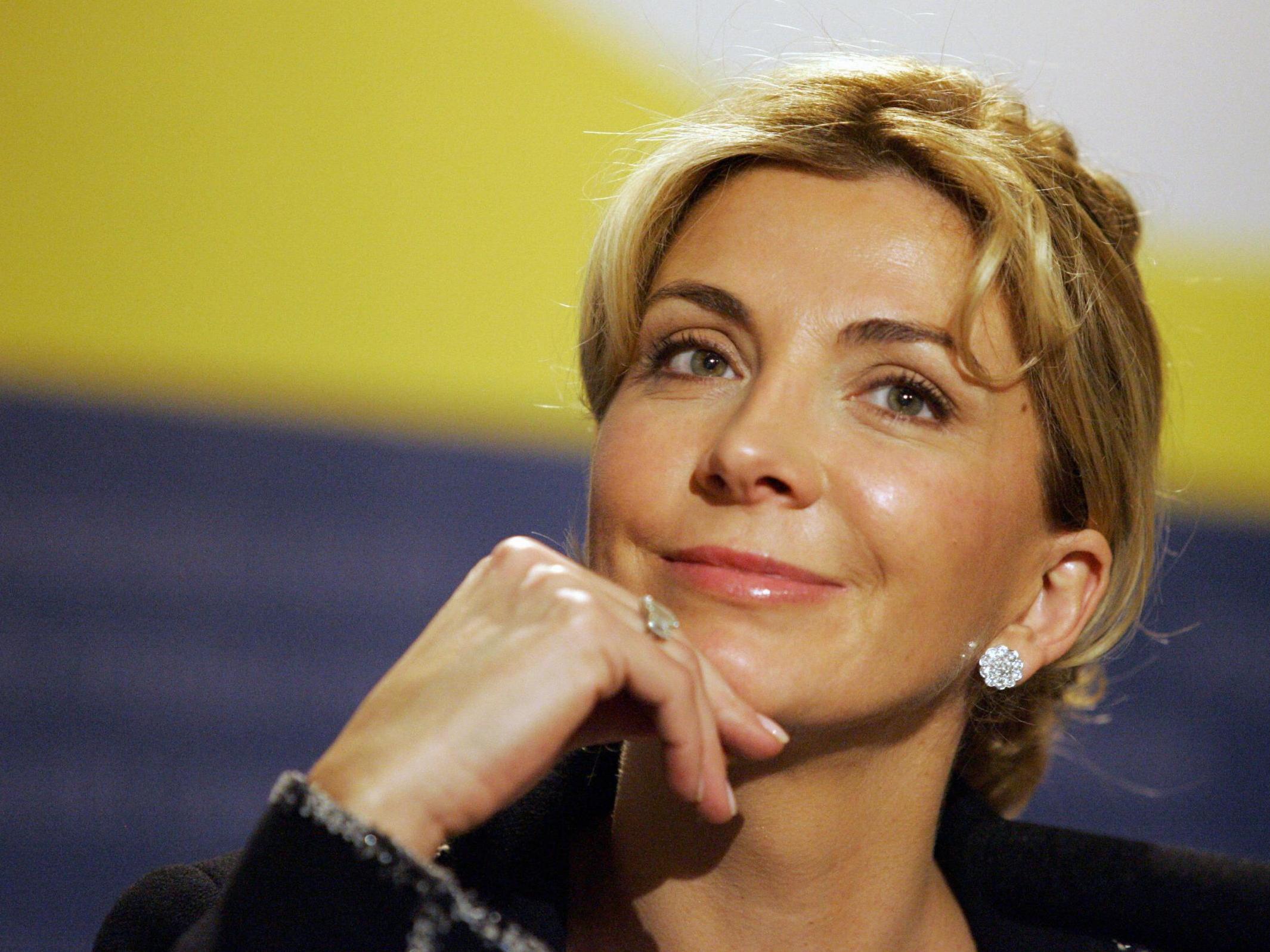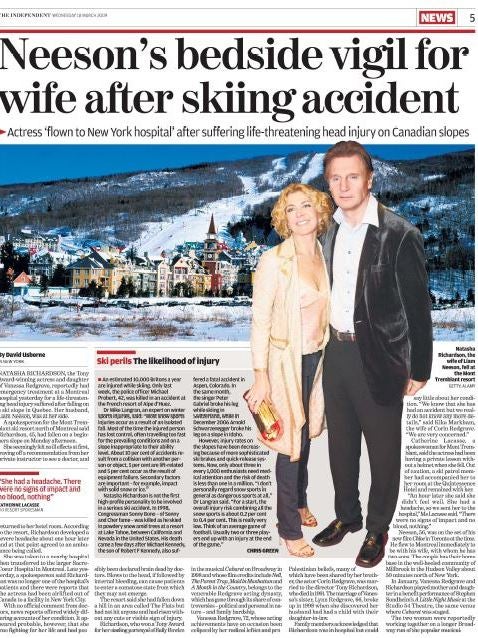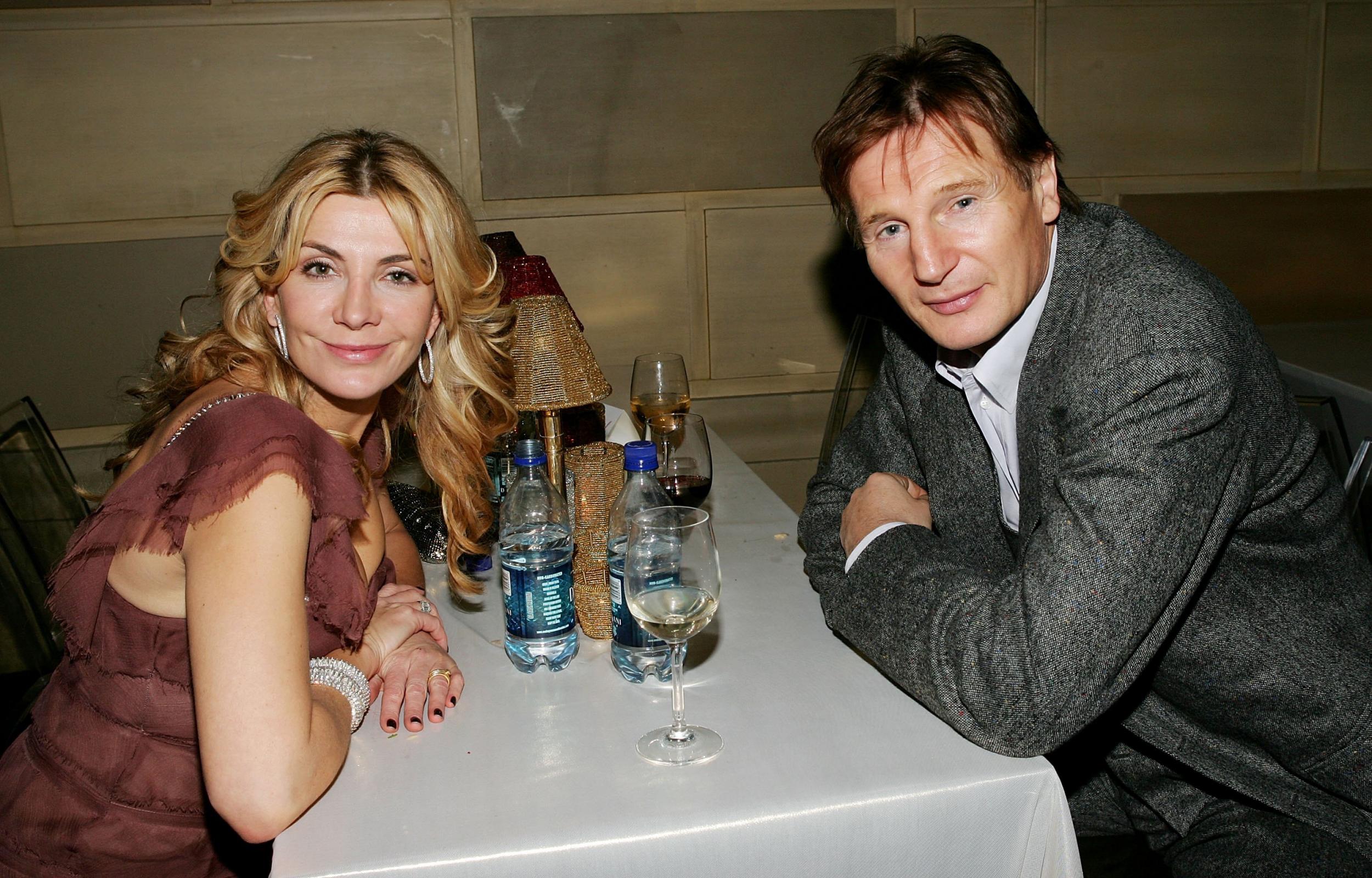A Life in Focus: Natasha Richardson, star of stage and screen
The Independent revisits the life of a notable figure. This week: Natasha Richardson, actor, from Friday 20 March 2009

Your support helps us to tell the story
From reproductive rights to climate change to Big Tech, The Independent is on the ground when the story is developing. Whether it's investigating the financials of Elon Musk's pro-Trump PAC or producing our latest documentary, 'The A Word', which shines a light on the American women fighting for reproductive rights, we know how important it is to parse out the facts from the messaging.
At such a critical moment in US history, we need reporters on the ground. Your donation allows us to keep sending journalists to speak to both sides of the story.
The Independent is trusted by Americans across the entire political spectrum. And unlike many other quality news outlets, we choose not to lock Americans out of our reporting and analysis with paywalls. We believe quality journalism should be available to everyone, paid for by those who can afford it.
Your support makes all the difference.Natasha Richardson had a versatile talent that enabled her to triumph in plays by Ibsen, Chekhov and O’Neill as well as musicals, farces and contemporary drama. She had a penchant for playing edgy, volatile women with unsuspected complexities – notable portrayals included the title roles in the play Anna Christie and the film Patty Hearst, and the heroines of The Seagull, Suddenly Last Summer, Zelda [Fitzgerald], Cabaret and A Streetcar Named Desire.
She had a distinguished pedigree as part of a great theatrical dynasty – her parents were the actress Vanessa Redgrave and the director Tony Richardson, her aunt was Lynn Redgrave, her uncle Corin Redgrave and her grandparents were Sir Michael Redgrave and Rachel Kempson. For the last 15 years she was the wife of the actor Liam Neeson, with whom she had two sons.
Though she starred in several successful plays on television, and made such films as Nell (1994), Maid in Manhattan (2002) and Walt Disney’s The Parent Trap (1998), she was probably best known for her impressive body of work in theatre, particularly in New York. She was awarded a Tony in 1999 for her electrifying performance as Sally Bowles in Sam Mendes’s production of Cabaret, and her love affair with the US was such that she had become an American citizen. Although she rarely acted with other Redgraves, stating, “I’ve shied away from working with my family. You’re so open to the charge of nepotism”, in January 2009 she co-starred with her mother in a one-night benefit concert performance of Stephen Sondheim’s A Little Night Music at New York’s Studio 54. Her Desiree Armfeldt, wistfully singing “Send in the Clowns”, and her mother’s Madame Armfeldt, who nurses her rueful memories of past “Liaisons”, were rapturously received, and there were plans to stage an eagerly anticipated full-scale revival on Broadway with the same two actresses.

Born in London in 1963, it was perhaps inevitable, given her heritage, that Richardson should choose an acting career (her younger sister Joely and cousin Jemma are also actresses), and she made her screen debut at the age of four, playing a flower girl in her father’s film, The Charge of the Light Brigade (1968). At the age of 14 she was taken by her father to New York for the first time. They stayed at the Algonquin, and it was the start of her lifelong love affair with the city. “There are things that I love about Europe,” she said, “but I find with American people there is an energy and an enthusiasm you don’t find in Europe.”
She was educated at St Paul’s Girls School in London, then trained at the Central School of Speech and Drama before joining the West Yorkshire Playhouse in Leeds, where she made her stage debut in Tom Stoppard’s On the Razzle (1983), a farce based on the same source material as the musical Hello, Dolly. Auspiciously, her first London appearance was as Ophelia in Hamlet at the Young Vic in 1985, followed the same year by Helena in A Midsummer Night’s Dream at the Open Air Theatre in Regent’s Park. She then won plaudits for her portrayal of Nina in Chekhov’s The Seagull at the Queen’s Theatre in 1985, a performance that won her a Plays and Players Award as Most Promising Newcomer.

When the play opened, Samantha Eggar was playing Madame Arkadina, but midway through the run she was replaced by Richardson’s mother, Vanessa, something Natasha hadn’t counted on. “Having a legend for a mother is one thing,” she told the Newsday reporter Peter Marks, “but facing her on stage night after night is quite another. It was scary. The first day, I was suddenly aware that I’m on the stage with this overwhelming actress. It made me want to run and hide.”
Her first television role was that of a young prostitute in the mini-series Ellis Island (1984), after which she played Violet Hunter in “The Copper Beeches” (1985), an episode of the series The Adventures of Sherlock Holmes starring Jeremy Brett. The role of Tracy Lord, the willowy, unconventional heroine of High Society, a 1987 stage version of the film musical, itself based on Philip Barry’s comedy The Philadelphia Story, would seem to have been canny casting, but the show was but a shadow of the film musical, which itself had been a shadow of the original play, and only Angela Richards, playing one of the reporters, emerged with credit.
Richardson was impressive, though, as Mary Shelley in Ken Russell’s film Gothic (1986), which was followed by convincing performances in Pat O’Connor’s lyrical off-beat First World War drama, A Month in the Country (1987) with Colin Firth and Kenneth Branagh and, in marked contrast, Patty Hearst (1988), in which she played the kidnapped heiress who becomes captivated by her terrorist captors. She was top-billed in Volker Schlondorff’s The Handmaid’s Tale (1990), set in a dystopian future, but despite a prestigious pedigree (script by Harold Pinter from a novel by Margaret Atwood), it was a pretentious misfire.
In 1990 Richardson married the theatre producer Robert Fox, himself a member of an acting dynasty, but they divorced in 1993. In 1991 Richardson starred in the Young Vic’s production of Anna Christie, Eugene O’Neill’s play about a prostitute who arrives from the Midwest to New York’s waterfront for a reunion with her estranged father, and falls in love with a sailor. By the time the successful run was over she had decided to mount a campaign to get the play staged in New York. It was staged in 1993 by the Roundabout Theatre, with Rip Torn as the father and Liam Neeson playing (at Richardson’s suggestion) the sailor lover – the pair had first met 10 years earlier on the set of Ellis Island.
“I know that it’s boring to say it,” she said, “but to be working on Broadway, in this city I love, is an incredible experience.” The play was a triumph, especially for Richardson, described by The New York Times as giving “what may prove to be the performance of the season”, while Newsday described her as “complicated and captivating”.
The fact that Richardson and Neeson were in love soon became general knowledge, bringing an extra frisson to their love scenes in the play. The pair married in November 1993, just after her divorce from Fox. Earlier the same year, Richardson had given a powerful performance in a television version of Tennessee Williams’s Suddenly, Last Summer, playing the traumatised Catherine, whose dreadful secret is dredged up in a gruelling 15-minute soliloquy, with Maggie Smith as the bereaved mother trying to have her silenced. Other television roles included that of John McCarthy’s girlfriend in the depiction of the journalist’s kidnapping and imprisonment, Hostages (1993), and another real-life character, the quixotic Zelda Fitzgerald, in Zelda, the same year.
The film Nell (1994) was primarily a showcase for Jodie Foster, as a girl who has grown up totally apart from civilisation, but it teamed Richardson and Neeson once more. In 1998 she starred in the musical Cabaret, on Broadway again for the Roundabout Theatre, and she won a Tony Award as Best Actress in a Musical for her uninhibited portrayal of Sally Bowles, stopping the show with her distinctive performance of the title number.
Though the Redgrave family were no strangers to controversy (Vanessa’s extreme radicalism and support of Palestine, Sir Michael’s belatedly revealed homosexuality, and Lynn’s sensational divorce when she discovered that her husband had been sleeping with their daughter-in-law all contributed to their notoriety) Natasha made few headlines, but she received some adverse publicity when director Danny Brocklehurst wanted to remake Saturday Night and Sunday Morning, the film based on Alan Sillitoe’s novel, which Tony Richardson had produced in 1960. Against Sillitoe’s wishes, Richardson blocked the remake, citing “personal reasons”.
After playing Anna in the Broadway production of Patrick Marber’s Closer (1999), which failed to equal its London success, Richardson made several films including the last Merchant-Ivory production, The White Countess (2005), which also featured Vanessa and Lynn, Asylum (2005), Evening (2007) and Wild Child (2008). Her most recent Broadway role, before the Little Night Music concert, was that of Blanche DuBois in a Roundabout presentation of A Streetcar Named Desire (2005). Admirers had already been posting requests on the internet for details of booking for the anticipated Broadway production of A Little Night Music co-starring her mother when the news of her tragic skiing accident was reported.
Natasha Jane Richardson, actor, born 11 May 1963, died 18 March 2009
Join our commenting forum
Join thought-provoking conversations, follow other Independent readers and see their replies
Comments